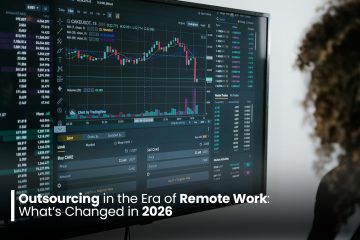Let’s face it, you’re constantly juggling a million things as a business owner. Imagine getting some time back, leaning on experts and maybe even cutting costs. Loads of businesses are going this route. You’re probably looking into making your financial stuff smoother, maybe sorting out outsourced accounts payable or finding a solid team for all-around financial accounting outsourcing.
However, the little voice creeps in, the one that whispers about your most sensitive data. Your financial records are the lifeline of your business. Handing them over to an external partner can feel like a leap of faith. The big question on everyone’s mind? Is outsourced accounting safe?
A lot of people ask about the security of their financial info when they think about outsourced accounting so you’re definitely not the only one concerned. It’s totally understandable. Here’s the deal: outsourcing can actually be really safe but it’s all about knowing the ropes. You need to be aware of any risks and pick a trustworthy partner.
Are you thinking about handing over your company’s finances to someone else? It’s like giving them the keys to the whole place. Before you do that, you’d totally want to check them out, right? Who are they? What’s their deal? Can they actually handle things? Same goes for outsourcing your finances. You’re letting someone peek behind the curtain at all your money stuff, how you make decisions and what you’re planning for the future. So, you gotta do your homework. It’s not just about if they know their numbers. You need to know if they keep your info safe, if they play by the rules and if you can really count on them.
Why Data Security Isn’t Just a Buzzword in Outsourced Accounting
Your financial data isn’t just a bunch of numbers. It’s really the story of your business. We’re talking about everything like employee paychecks, payments to vendors (including those outsourced accounts payable things), how much profit you’re making and what you think might happen in the future. If someone gets into this stuff, it could be really bad.
- Financial Loss: The loss of money to theft, fraud and the recovery efforts can seriously hurt your profits.
- Reputational Damage: Trust issues with clients and partners? That can be a really tough spot to get out of.
- Legal and Regulatory Penalties: A data breach can really land you in hot water. Depending on what you do and what kind of info got leaked, you’re talking serious fines and a whole mess of legal drama.
- Operational Disruption: Handling security incidents is a real time-sink and can seriously distract from running the business.
It’s really risky to bring in outside help with all these data breaches happening, especially for things like accounting. Lots of companies have gotten into trouble because their partners weren’t secure. Thus, when picking an outsourced accounting firm, you’ve got to really check them out. You need to look at their security stuff, how they handle things, if they follow the rules and how well they’ve protected data in the past. If you don’t do your homework, you could lose money, damage your reputation, get sued or face fines. You need to be super careful when choosing vendors to avoid security problems.
Navigating the Common Security Concerns
The key to protecting ourselves is figuring out the dangers. Here are some typical security issues that come up when you outsource financial accounting services.
- Unauthorized Access: You need to worry about people getting into your financial systems who aren’t supposed to. Could be some hacker from the outside or even an employee from that outsourcing company who’s mad or wasn’t checked out properly. If you have weak passwords, no two-step verification and don’t control who gets access, your system is basically wide open.
- Data Transmission Vulnerabilities: Basically, sending unencrypted financial documents is like sending postcards. Anyone can read them. This is a real problem for things like outsourced accounts payable where you’re constantly sharing info.
- Human Error: Look, it’s not always these super-hackers you gotta worry about. Often, the real headaches come from simple slips-ups. For instance, someone sends a confidential report to the wrong email, messes up the settings for who can see what or loses a device without encryption. Just like that, you’ve got a data breach.
- Inadequate Vendor Due Diligence: Not going through proper due diligence when picking an outsourced accounting firm can backfire big time. Going with the cheapest option without checking their security setup? You might end up with a partner who’s got shaky systems, old-school security or just isn’t serious about keeping your data safe.
Why Compliance Matters?
Depending on your line of work and where your clients are, you’ve probably got to deal with a bunch of data protection rules. These aren’t optional, they’re actual laws meant to keep sensitive info safe. For instance:
- SOX (Sarbanes-Oxley Act): For publicly traded US companies, SOX demands strong internal controls and data accuracy in financial reports. Your outsourced accounting partner needs to follow these rules.
- GDPR (General Data Protection Regulation): If you deal with data from people in the EU, GDPR makes you have strong privacy protections and you’ll get hit with big fines if you mess up. This means your financial accounting services provider needs to be super careful with certain data.
- CCPA (California Consumer Privacy Act): If your business handles personal info of Californians even through an outsourced accounting team with payroll or benefits data, remember the CCPA gives those residents rights over their data.
You definitely want your outsourced accounting partner to be on top of all the regulations. They should have the right certifications and procedures to keep everything compliant. Check if they’ve got certifications like SOC 1 and SOC 2 – these show they’re serious about security, availability, processing integrity, confidentiality and privacy. ISO 27001 is another good one for information security. Moreover, if you deal with credit card info, PCI DSS compliance is a must.
Building a Fortress: Best Practices for Secure Outsourced Accounting
You need to hit it from all angles to get outsourced accounting right on security means. First up, pick your vendor carefully, do your homework, make sure their security is tight and talk to their clients. Get everything ironed out in a solid contract – who owns the data, keeping things hush-hush, security rules and what to do if something goes wrong. Use tech that keeps stuff safe like encrypted lines and getting systems to play nice. Don’t forget keeping an eye on things, reporting regularly, doing audits and making sure only the right people can get in. All that’s key for staying secure and avoiding trouble.
- Due Diligence: Don’t jump into anything. It’s super important to check out potential partners really well before making any decisions.
- Certifications and Audits: Make sure they have SOC 2 Type II and ISO 27001 certifications. This shows someone else checked their security. Also, find out how often and what happened during their cyberattack simulations (penetration tests) to see if they found any weak spots.
- Background Checks: Make sure the outsourcing company does background checks on everyone who’ll handle your private information.
- References and Case Studies: Definitely reach out to their current clients, especially those in your field, to get the real scoop on their security track record.
- Certifications and Audits: Make sure they have SOC 2 Type II and ISO 27001 certifications. This shows someone else checked their security. Also, find out how often and what happened during their cyberattack simulations (penetration tests) to see if they found any weak spots.
- Define Strong Contracts and Service Level Agreements (SLAs): Alright, let’s make this less formal. Your contract needs to spell out who’s doing what when it comes to keeping data safe.
- Data Ownership and Return: Just to be clear, your financial data is yours and we’ll make sure it’s given back safely or deleted when our contract ends.
- Incident Response Plan: You need to have a solid incident response plan in place. It should clearly state when and how notifications go out (ideally within a day of confirming a breach), who talks to who and exactly what steps you’ll take to fix things.
- Security Standards and Compliance: Tell the outsourcing partner what security rules and legal requirements they have to follow.
- Audit Rights: It’s key that we can check the provider’s security every so often.
- Data Ownership and Return: Just to be clear, your financial data is yours and we’ll make sure it’s given back safely or deleted when our contract ends.
- Implement Technical Safeguards: Think of your data’s digital shield as a full toolkit for keeping your information safe. It’s all about using things like access controls, encryption and firewalls to stop anyone who shouldn’t get to your data. You’ve also got antivirus software, ways to prevent data loss, regular security checks, training to keep everyone in the loop and physical security measures. Plus, having solid backups means you’re covered if the worst happens. All these pieces work together to make sure your data stays private, accurate and always available when you need it.
- Encryption in Transit and at Rest: Keep everything under lock and key! Make sure all data moving around or sitting on servers is scrambled up tight with something strong like AES-256 encryption. That way, only the right folks can actually read it.
- Multi-Factor Authentication (MFA): Make everyone use MFA to log in, especially the admins. It’s like adding a double lock to your door – way safer if they need a couple of things to prove it’s really them.
- Role-Based Access Control: Only give employees access to the data and systems they really need to do their jobs.
- Secure Communication Channels: For sensitive stuff like accounts payable documents sent to outside vendors, let’s stick to safe transfer methods: SFTP, FTPS or encrypted email.
- Encryption in Transit and at Rest: Keep everything under lock and key! Make sure all data moving around or sitting on servers is scrambled up tight with something strong like AES-256 encryption. That way, only the right folks can actually read it.
- Ongoing Monitoring and Audits: To keep security on track is a constant effort and not a set-it-and-forget-it deal; it’s a constant effort.
- Continuous Logging and Monitoring: The outsourced accounting provider needs to keep a close eye on everything happening in the system. They should have thorough records and set up alerts to spot anything that looks out of place or sketchy.
- Regular Vulnerability Assessments and Penetration Testing: Let’s get outside security pros to do penetration testing every quarter at a minimum. That way we can catch any security holes early and fix them up.
- Annual Compliance Reviews: We need to make sure all our security certifications and compliance stuff gets checked and updated every year.
- Continuous Logging and Monitoring: The outsourced accounting provider needs to keep a close eye on everything happening in the system. They should have thorough records and set up alerts to spot anything that looks out of place or sketchy.
Choosing the Right Provider: It’s More Than Just Numbers
If you’re planning to hire someone to handle your financial accounting, definitely make sure they take data security super seriously. Here’s what you need to keep an eye out for when choosing a partner.
- Proven Track Record: Ask for proof they can keep data safe for the long haul such as case studies and references that show they haven’t had any breaches.
- Robust Technology Stack: Make sure they use well-known cloud providers like AWS or Azure – these have good security and meet industry rules. Also, check out the security at their data centers.
- Transparent Reporting: Look for a vendor that gives you security dashboards and audit summaries regularly. It shows they’re open about what they’re doing and always working to get better.
- Scalable Security: When your company expands and the amount of data you have goes up, make sure your partner’s security can grow with it so you keep the same level of security.
Picking vendors who really care about security saves you a ton of headaches later on, like way fewer security mess-ups. It’s definitely worth the time to find a partner who’s solid on security, especially when it comes to outsourced accounting.
The Bottom Line: Outsourced Accounting Can Be a Safe and Strategic Move
So, back to the big question: “Is outsourced accounting secure?” Absolutely, it can be safe as long as you’re serious about protecting your data. If you do your homework, set up solid contracts, make sure you have the right security measures in place and stay on top of things, you can definitely enjoy the upsides of outsourcing without sweating about your financial info.
It is important to team up with a company that really gets how crucial data protection is and actually walks the talk when it comes to top-notch security. Don’t be shy about grilling them, insist on openness and make security your absolute top priority. It’s totally worth it for your own sanity and your business’s safety.Ready to see how secure outsourced accounting can help your business? Reach out to our expert team at Glocal Accounting today. We’re all about offering top-notch accounting and the confidence that your financial data is well protected.



0 Comments